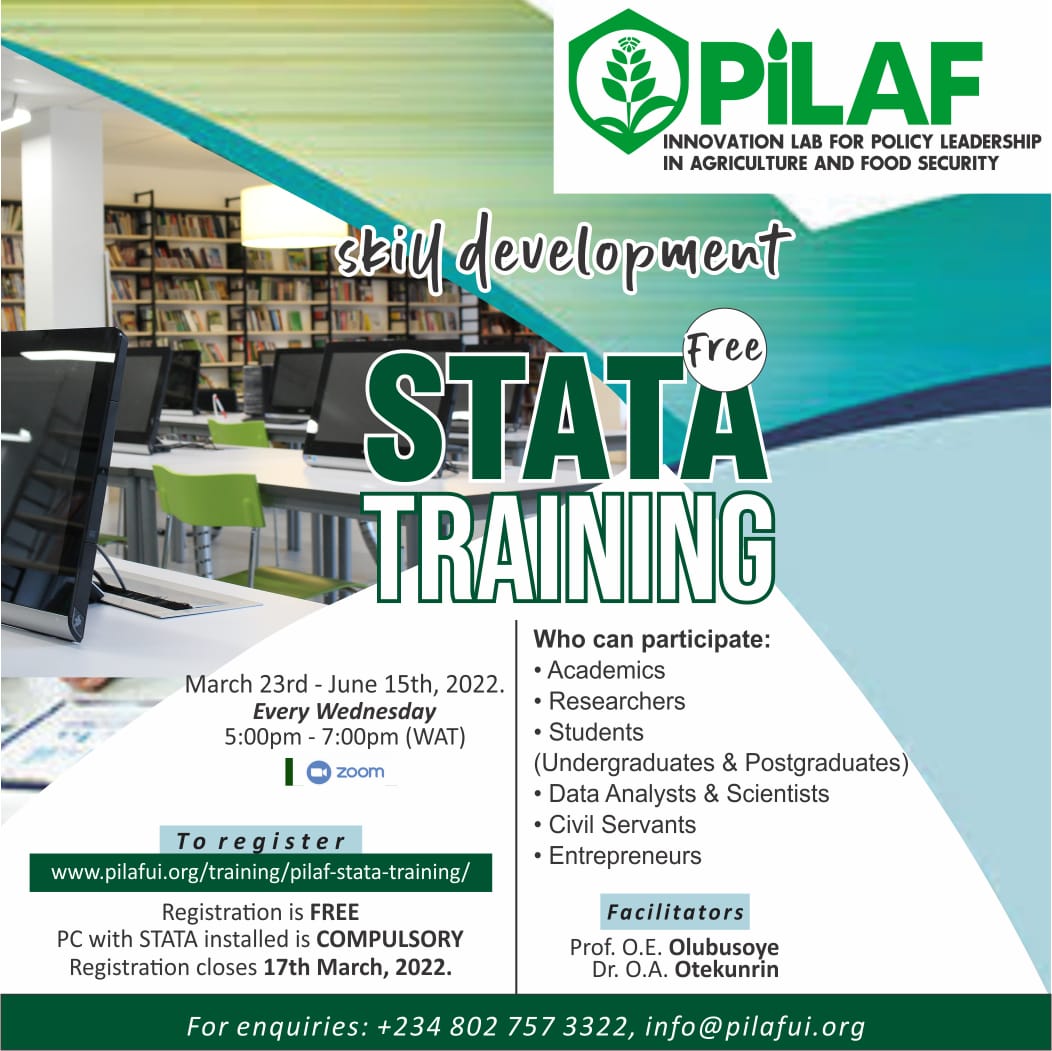PRCI partnering with PiLAF: building global community and Nigerian food systems
New Nigerian innovation lab tackles policy, training, research, and outreach with the support of PRCI.
The Innovation Lab for Policy Leadership in Agriculture and Food Security (PiLAF) based out of the University of Ibadan (UI), Nigeria is working to build local food systems and global connections through research, training, and outreach. In 2018, the Centre for Petroleum, Energy Economics and Law (CPEEL) in collaboration with the department of Agricultural Extension and Rural Development at UI was chosen by the Michigan State University Feed the Future Innovation Lab for Food Security Policy Research, Capacity, and Influence (PRCI) as one of three African Centers for Policy Leadership along with L’Institut Sénégalais de Recherches Agricoles (BAME-ISRA) in Senegal and The Economic Policy Research Center (EPRC) in Uganda. Through the collaboration of MSU and UI, PiLAF was created. Their vision is to become a major contributor of evidence-based analysis and policy advice to Nigerian agricultural policy makers.
In January 2021, PiLAF launched, focusing on the poultry value chain with a combination of analysis, technical trainings, and outreach to stakeholders and policymakers. From inception, their mission has been to connect agricultural stakeholders with policy makers through research, outreach, and training. In collaboration with partners at MSU, PiLAF has conducted a food commodity market price survey, has strengthened its network across domestic and international organizations, held a major poultry stakeholders’ engagement forum which initiated the poultry value chain study, and conducted trainings on qualitative and quantitative research methods.
Local STATA training connects the global community
 What began as a training for local researchers on STATA, a data analysis software, has become a global phenomenon. Local researchers needed to know how to use this vital software, so a training was developed from the ground up to teach people with no previous knowledge how to use STATA. Due to the COVID-19 pandemic and the urge to share knowledge across a broader spectrum, the training was designed to be online. Using Google Classroom as an interface, the training facilitates access to video recordings, lecture notes, quizzes, questions, and self-guided lessons, as well as group discussions.
What began as a training for local researchers on STATA, a data analysis software, has become a global phenomenon. Local researchers needed to know how to use this vital software, so a training was developed from the ground up to teach people with no previous knowledge how to use STATA. Due to the COVID-19 pandemic and the urge to share knowledge across a broader spectrum, the training was designed to be online. Using Google Classroom as an interface, the training facilitates access to video recordings, lecture notes, quizzes, questions, and self-guided lessons, as well as group discussions.
The weekly training has been extremely popular, with more than 400 students from around the world attending. Several weeks into the training, new students were still asking to join. Rather than the usual experience of having class attendance drop over time in online trainings, class attendance went up. Lively dialogs between students developed, creating a collective learning experience from a distance.
Connecting the links of the Nigerian poultry value chain
In addition to their fruitful training initiative for researchers, PiLAF has been on the ground working for stakeholders in the Nigerian poultry value chain by bridging gaps between policymakers, producers and sellers. Their research has examined the extent to which existent policies have been effective — or not — and how they have impacted the value chain.
Improving the poultry value chain involves a process of education. Raising the awareness of Nigerian policymakers and associated stakeholders has been the key to getting poultry policy on the agenda. PiLAF has been identifying knowledge gaps, finding key stakeholders, and designing research proposals that can help inform these policies. Considerations of conditions and current policy must be taken into account to create research proposals that will generate effective data.
Part of the challenge of making useful policy recommendations is to create a body of evidence around which a far-reaching consensus can emerge and outlast political and governance changes. Through research dissemination on multiple communication channels, including briefs, meetings, presentations, and social media, PiLAF researchers intend to do just that. By collaborating with city governments, government agencies, equipment fabricators, and poultry farmers, PiLAF faculty hope to give policy a human face and data driven recommendations.
Moving forward into a future of collaboration
Completing research on the poultry value chain is only the first step for PiLAF. While it is now funded by PRCI, the goal is continuity, and long-term research through grants to examine other value chains important for food security. PRCI Director David Tschirley, Saweda Liverpool-Tasie, and Nicole Mason-Wardell from the Department of Agricultural, Food, and Resource Economics (AFRE) Food Security Group (FSG) have supported PiLAF through capacity building, faculty training, research development and execution, as well as co-writing papers. John Bonnell and Cait Goddard from MSU’s Borlaug Higher Education for Agricultural Research and Development (BHEARD) have also been integral to the initial development of PiLAF, working with center leadership to build their institutional capacity. They have helped to create an action plan and build in indicators of success. Both Bonnell and Goddard continue to touch base with PiLAF faculty every two weeks.
Through trainings, research, and global connections, PiLAF is strengthening Nigerian capacity to improve local food system resilience. Partnering with Michigan State University, PiLAF’s faculty are creating transformative action that has started locally but has echoed across the globe.



 Print
Print Email
Email




